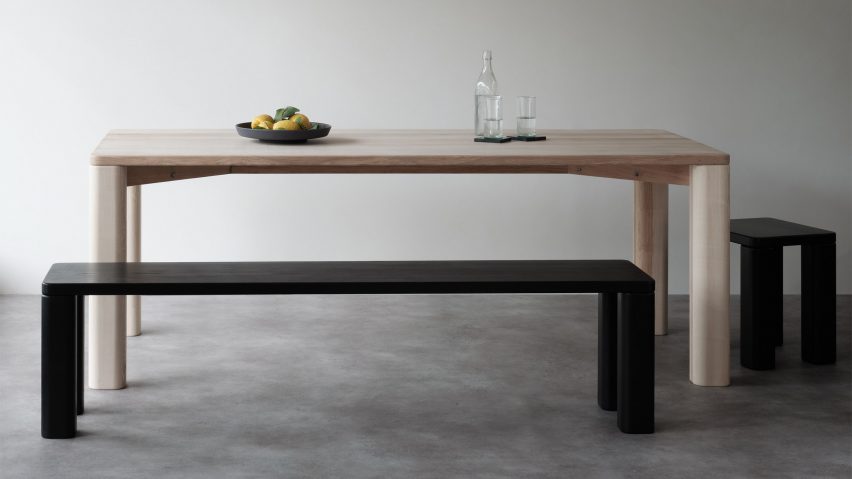Social enterprise Goldfinger has launched its bespoke Tate Modern furniture collection made from fallen trees at London Design Festival.
Displayed at the Material Matters design fair, the furniture was originally designed in collaboration with architecture studio Holland Harvey and the Tate Modern as custom pieces for the gallery's Corner cafe.
It includes a dining table, bench and stool made from fallen ash trees, chosen by Goldfinger to make use of timber that would otherwise be destroyed while celebrating the beauty of native British wood.
"In collaborating with Holland Harvey and Tate Modern, I think we all saw the wide appeal of the sleek and bold design, the ash rescue story, as well as being able to own a piece of Tate Modern," Goldfinger associate Lisa Werner told Dezeen.
"This is Tate's first foray into furniture and celebrating their commitment to sustainably-minded partners at the outset is really impactful for the commercial market."
The furniture has chunky square legs with rounded corners, intending to reference the Tate Modern building and Trellick Tower, where the Goldfinger workshop is located.
Available in natural and black ash finishes, each piece of furniture features an engraving of the coordinates of where the tree used to make it once stood.
"We love to incorporate this storytelling of the tree's journey," said Werner.
"It is a Goldfinger signature detail to stamp the GPS coordinates of where the tree once stood into each piece, providing a sense of memory and honour for the tree's first life."
For the Tate Modern collection, ash wood was sourced from timber company Fallen and Felled, which rescues trees that have fallen due to disease, weather-related reasons or urban development.
According to Goldfinger, 5,000 trees in London are felled annually, most of which are chipped and burned. The studio aims to save the fallen trees from being destroyed by making them into furniture.
"This not only saves the tree from being chipped or burned for biofuel, it sequesters carbon and removes the need to cut down forests," said Werner.
"Over 90 per cent of Britain's hardwood is imported, we're on a mission to reverse that trend and promote the raw materials we have right on our doorstep."
"The UK is the second largest importer of wood behind China," added Leslie Feeney, Goldfinger head of impact and partnerships. "There is a lack of knowledge of the wood available to us in the UK."
Alongside Goldfinger's commitment to making furniture from fallen trees and reclaimed wood, which co-founder Marie Cudennec Carlisle spoke with Dezeen about in an interview, the studio is also a social enterprise that organises woodworking workshops and hosts free meals for the local community.
The Goldfinger Academy gives training and career opportunities to local residents and those who are out of education and employment, while the Future Makers programme offers students insight into the industry and portfolio development.
In 2015, Goldfinger launched the People's Kitchen initiative, which offers monthly free meals for the local North Kensington community.
Elsewhere at London Design Festival, designer Giles Nartey presented a large bench with a carved surface used as a game board and architect Daisuke Motogi reimagined Alvar Aalto's Stool 60 into one hundred different iterations.
The furniture is on show at Material Matters from 20 to 23 September 2023 as part of London Design Festival. See our London Design Festival 2023 guide on Dezeen Events Guide for information about the many other exhibitions, installations and talks taking place throughout the week.

